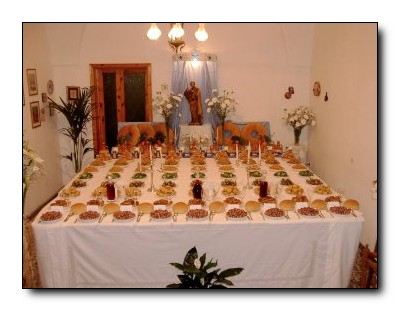 Image Credit
Image CreditAfter exhorting his monastic charges to "listen" and "arise" from spiritual slumber, St. Benedict continues along the same train of thought to include a solemn invitation to holiness in the form of a kind of scriptural "dialogue." The Lord seeks his workmen and, crying out, poses the quintessential question in this section of the prologue (14-19): "What man is there that desires life, and deign to see good days?" (Psalm 43:12) Quoting the Psalmist, he poses the question that is at the center of all Christian experience: the longing for life, and the desire for good days, i.e. eternal life. This is no mere rhetorical question, but is one that is posed to every monk, every priest, every lay Christian laboring int he world-the housewife, the father, the schoolboy and schoolgirl.
The monk, responding to the voice like a soldier responds to the call of his commanding officer, hails "I am the one.!" St. Benedict expects his monks respond to this call without a moment's hesitation.
St. Benedict responds to this summons, this invitation, with another scriptural quote: "If you desire true and eternal life (
veram et perpetuam vitam), keep your tongue from evil, and your lips from speaking deceit. Turn aside from evil and do good, seek peace and pursue it." (Psalm 34: 13-14) The answer to the summons is one of directness, drawn again from Scripture, from the same Psalm, exhorting us to seek this eternal life by turning aside from evil, like a Roman legionary who, upon taking the oath, the
sacramentum, turned away from civilian life and devoted himself completely to the "Senate and People of Rome." Likewise, St. Benedict's monks were to turn from the world, and live a life of total dedication to God in such a way that their tongues, and their lips, were no longer their own, but God's.
"And when you have done these things, my eyes will be upon you and my ears towards your supplications; and before you call upon me I will say to you: Behold, I am here." (18; Isaiah 58:9) The rhythm of dialogue, scripture, and response come to a close in this prophetic passage, where our Lord promises his people his eagerness to hear their prayers. In this context it serves as a promise, a covenant, that the total consecration of life, of speech, will bring us into the very presence of God, holding out the hope of an intimate encounter with God where He, before we even utter a word, says to us "I am here, my son."
This section ends in verse 19, where St. Benedict culminates this dynamic scriptural dialogue with an almost ecstatic affirmation of God's loving graciousness: "What can be sweeter to us (
dulcius nobis) than the voice of the Lord inviting us, dearest brothers? Behold, in his loving kindness the Lord shows us the way of life."
The prayer of St. Ephrem the Syrian:
O Lord and Master of my life,
Drive away from me the spirit of despondency, negligence, avarice, and idle talk.
But grant unto me, thy servant, the spirit of chastity, obedience, patience and love.
O Lord and King, grant me to see mine own transgressions, and not to judge my brother.
For blessed art thou unto the ages of ages, amen.

